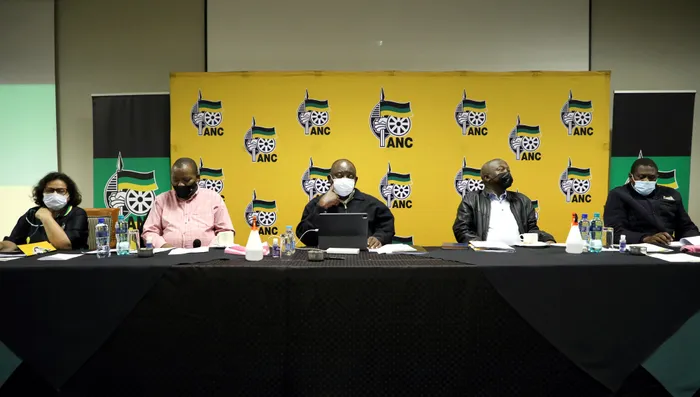Dark days ahead for Ramaphosa

ANC President Cyril Ramaphosa with Acting Secretary General Jessie Duarte, Nationa Chairperson Gwede Mantashe, Deputy President David Mabuza and Treasurer General Paul Mashatile during the party's special NEC meeting about coalitions. Picture: Oupa Mokoena/African News Agency(ANA)
Graphic: Timothy Alexander / African News Agency (ANA)
By Kim Heller
For South Africans, it has been a winter of despair; a time of darkness after season upon season of lost hope. The once brilliantly lit prism of promise that lit the early skies of post-apartheid South Africa and the warm amber of a new-born optimism for justice and equity is no longer.
President Cyril Ramaphosa’s New Dawn is proving to be the darkest time in South Africa’s democracy. It could be argued that in his four years in office, Ramaphosa, has materially achieved considerably less for ordinary South Africans than any other democratically elected president before him.
The early spell of Ramaphoria has come to an end far earlier than any spin-doctor could have predicted. Ramaphosa’s ever-ready swell of promises has turned into an ash that has seeped into and sullied the nation’s long-suffering belief in a better tomorrow.
During a television interview in January 2018, Ramaphosa said: “we shall redouble our efforts to build a society in which black poverty and white privilege are consigned to the past”. Yet he has failed dismally to tackle the pandemic of structural racism and inequality and of the every-day savage and ravage of privilege and poverty.
Ramaphosa’s inability to remedy and restore economic stability, his failure to unite and rejuvenate the ANC, and his impotency in stewarding in meaningful social economic policies was evident well before Covid-19 spread itself, so unwelcomingly and so devastatingly, over the South African landscape.
From the very start, and over the past four years, Ramaphosa has been a very poor caretaker of the nation. Under his administration, the ANC has wilted and wasted. Voter enthusiasm has flagged; desperate ANC staffers have taken to the streets, in protest, after months of not being paid their due salaries, and organisational disunity has been super-sized. And now, with the Phala farm theft occupying pride of place in newspapers worldwide, the President of South Africa, has brought not only the ANC, into disrepute, but the country itself.
When he was appointed president, mainstream media in South Africa, in their merry making of myths and messiahs, blotted out that the real news that during his term as deputy president, Ramaphosa was unremarkable. In the ink of propagandist pens, little was penned about his lukewarm performance as the country’s second in command.
Four years later, the steroid-bold stroke of propagandist media spin has lost its vigour and vitality. Ramaphosa’s defence squad appear limp and spent after the dark, chilling revelations made by former state security head, Arthur Fraser in his criminal complaint against the president. This cloud of darkness has cast an ugly shadow over the figure and future of Ramaphosa. The first citizen of the country now faces possible criminal charges, including of money laundering, kidnapping, torture of suspects and the concealing of a crime at his Limpopo based farm. The over-traded image of Ramaphosa as a godly warrior against crime and corruption has proved to be a political scam.
For the fawning journalists, analysts, and academics their picture-perfect portrait of Ramaphosa as an upright man, with impeccable integrity and a proven penchant for truth, transparency, and accountable governance, is, today little more than an abandoned canvas of a leader that never was. He is no leader, and the joke is on us. In a recent address to Ankole farmers, Ramaphosa told a gathering of farmers that his job as President of South Africa was “just a nice one to have” but that the “really good one” was to be President of the Ankole society.
There is no good story to be told about Ramaphosa. No lyrics from legendary song writers can change this tune. South Africans are increasingly growing impatient with the president, especially in the cavity of silence on critical issues such as the national electricity crisis, the punitive petrol price, the Goliath of unemployment, and the open grave of poverty.
Ramaphosa’s investor road shows, which have hardly generated much spark, over all these years, are now set to go up in smoke given the current energy crisis.
Even his strongest pipers have begun to call him to account. On Tuesday, Mavuso Msimang, an ANC stalwart implored the president to step aside pending investigations into the Phala farm theft. Msimang said: “He really owes it to both the ANC and the country to step aside and allow this thing to be fully investigated.”
Few in the ANC’s NEC’s have found their voice yet.

Philosopher Jean Paul Sartre wrote “every word has consequences”. Every silence too.” Perhaps as the winds of change sweep through the nation, on the fury of mother nature herself, sense and sensibility will sway ANC leaders in Parliament and in its branches.
Things are about to get worse for Ramaphosa. His involvement in the Marikana massacre is now lying heavily on his present. Last week’s South Gauteng High Court found that President Cyril Ramaphosa might be liable for the killing and injuring of thirty-four striking miners on August 16, 2012.
Sometimes words hurt. In a chain of email correspondence in the days leading up to the massacre, and after the killing of ten policeman, Ramaphosa, an Executive Director at Lonmin’s platinum mines at the time, called for ‘concomitant action.’
Addressing Parliament in May 2017, Ramaphosa conveyed remorse for his words, telling Members of Parliament: “I used inappropriate and unfortunate language, as expressed in the e-mails.”
Autumn may be on its way but for South Africa’s President Cyril Ramaphosa, the forecast looks chilly indeed.
Heller is Political analyst and author of ‘No White Lies: Black Politics and White Power in South Africa.’
This article is original to The African. To republish, see terms and conditions.
Related Topics: